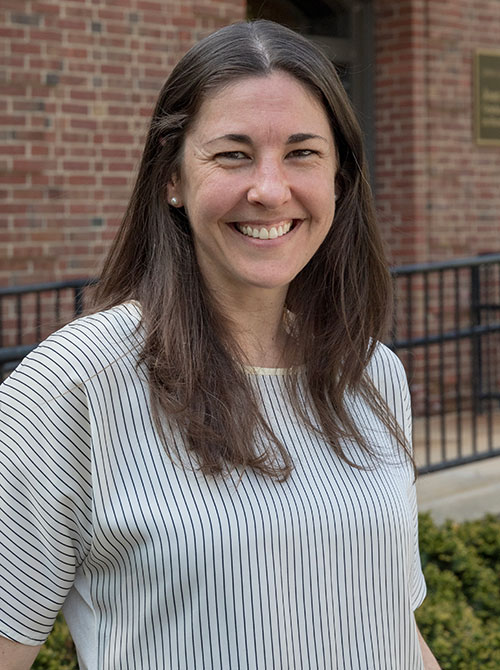Director of Curriculum, Human Genetics; Co-Director, Genome Health Analysis
BA/BS/BS, University of Washington. MS, Icahn School of Medicine at Mount Sinai. EdD, Teachers College, Columbia University. In addition to her duties as program director in human genetics, she is the course director for two first-year courses, a thesis advisor, and a graduate co-chair of the Sarah Lawrence College Institutional Review Board. Prior to coming to SLC, Claire worked as a cancer counselor and assistant director for the genetic counseling training program at Mount Sinai. Claire recently earned her doctorate in adult education, completing a dissertation on the professional learning of genetic counselors. SLC, 2015–
Previous Courses
MS Human Genetics
Case Management Practicum
Graduate Seminar—Spring
The Case Management Practicum utilizes a standardized patient model to provide students with the opportunity to demonstrate and assess their skill levels and competencies necessary for the practice of genetic counseling. Students participate in prepared role-playing exercises, followed by class discussion and feedback. The course structure allows students to demonstrate competence in key skills; assess their own strengths and weaknesses and those of their peers; and formulate a plan for addressing areas needing improvement.
Faculty
Evidence-Based Practice
Graduate Seminar—Fall
7339
This course frames the healthcare literature as the foundation of evidence for clinical practice. Students will understand that in order for literature to be translated into clinical practice to best serve patients, practitioners must be critical consumers of publications. To build a foundation of evidence-based practice, students will explore processes of clinical research and examine definitions of evidence. They will develop their own evidence-based practice by learning how to collate judgments about available data – judgments which are perpetually uncertain, ambiguous, and complex as research adds to and alters our present knowledge of health. By the end of the course, students will grow to be consciously critical clinical practitioners who personalize their case preparationto their patients by embodying a practice grounded in research-derived clinical skills.
Faculty
Fundamentals of Genetic Counseling 2
Graduate Seminar—Spring
Building on the skillset of Fundamentals of Genetic Counseling 1, Fundamentals of Genetic Counseling 2 develops skills relevant to clinical risk assessment. By traversing the path from calculations to care, students will understand that risks are composite predictions for future disease, assessment of those risks enables a preventive approach to healthcare, and outcomes of risk assessment are mediated by risk perceptions. Course activities include discussion, small group activities, demonstration, and role-play with peer feedback.
Faculty
Fundamentals of Genetic Counseling I
Graduate Seminar—Fall
Fundamentals of Genetic Counseling 1 introduces students to the skills necessary for genetic counseling. The course is structured around key components of a genetic-counseling encounter: contracting, family history, medical history, patient education, and documentation. Readings provide foundational knowledge of relevant concepts, and class discussions encourage comparison of different perspectives and applications. Course instructors demonstrate each skill; students then engage in skill development through role play, peer feedback, and self-assessment.
Faculty
- Claire Davis
- Janelle Villiers
Fundamentals of Genetic Counseling II
Graduate Seminar—Spring
Building on the skillset of Fundamentals of Genetic Counseling 1, Fundamentals of Genetic Counseling 2 develops skills relevant to clinical risk assessment. By traversing the path from calculations to care, students will understand that risks are composite predictions for future disease, assessment of those risks enables a preventive approach to healthcare, and outcomes of risk assessment are mediated by risk perceptions. Course activities include discussion, small group activities, demonstration, and role-play with peer feedback.
Faculty
Special Topics in Genetic Counseling: Gestalt Genetics
Graduate Seminar—Spring
7390
Genetic counseling is a complicated, bifurcated profession – one that forges connections between technological sciences and lived experiences of risk, health, and illness. Health humanities is a discipline which enables us to glean insights into these experiences by interacting with the arts - by reading, writing, watching, and moving, we’ll mine for meaning and understanding, wisdom and wit. This course aims to build empathic understanding and critical consideration of genetic counseling practice by exploring genetics, genetic illness, and the profession of genetic counseling as conveyed through books, films, and other media.
Faculty
Special Topics: Gestalt Genetics: Health Humanities for Genetic Counselors
Graduate Seminar—Fall
Genetic counseling is a complicated, bifurcated profession – one that forges connections between technological sciences and lived experiences of risk, health, and illness. In pursuit of expertise, we are steeped in complex concepts, mechanisms, regulations, specifications – part and parcel to the work of health professionals. The science is intricate and engrossing, yes… but what about the care and concern we provide for others, curiosity for individuals and the sense they make of the genetic challenges they face, the value of our work for ourselves, those we serve, and humanity? Health humanities is a discipline which enables us to glean such insights by interacting with the arts and humanities; by reading, writing, watching, and moving, we’ll mine for meaning and understanding, wisdom and wit. This course aims to build empathic understanding and critical consideration of genetic counseling practice by exploring genetics, genetic illness, and the profession of genetic counseling as conveyed through books, films, and other media.
